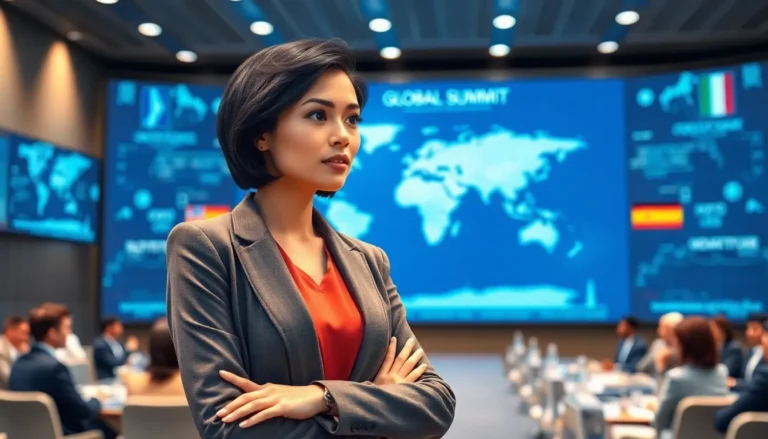In a world where alliances can shift faster than a cat on a hot tin roof, staying updated is crucial. International alliances are like the ultimate game of chess, where every move can lead to unexpected outcomes. Whether it’s trade agreements, military partnerships, or environmental pacts, these alliances shape the global landscape in ways that can leave even the most seasoned diplomats scratching their heads.
Table of Contents
ToggleOverview of International Alliances
International alliances play a crucial role in shaping global relations. These partnerships often focus on trade agreements whereby countries collaborate to enhance economic growth. Military alliances bolster defense strategies, providing mutual support in times of conflict. Environmental pacts unite nations in addressing climate change, emphasizing sustainable development.
Recent developments highlight the evolving nature of these alliances. For example, the Comprehensive and Progressive Agreement for Trans-Pacific Partnership (CPTPP) reflects an extensive trading network across the Asia-Pacific region. Additionally, NATO’s ceaseless adaptation to security threats ensures its relevance in contemporary geopolitics.
Geopolitical tensions in Eastern Europe showcase the complexity of military alliances. Countries are realigning their strategic partnerships, fostering new collaborations. Such shifts can lead to changing trade dynamics as nations reconsider import and export relationships.
Sustainability is becoming a driving force behind environmental pacts. Recent agreements aim to reduce carbon emissions and promote renewable energy sources. These initiatives underscore the collective responsibility of nations in combating climate change.
Monitoring international alliances is essential for understanding future global trends. Changes in one area can significantly impact other domains, from economics to security. Awareness of these intricate relationships helps stakeholders navigate the complexities of global diplomacy. Countries must engage in continuous dialogue to adapt to the rapid shifts in international alliances effectively.
Recent Developments in Major Alliances
Recent shifts in international alliances underscore the rapidly changing geopolitical climate. Key organizations are adapting to new challenges and opportunities, influencing global dynamics.
NATO Updates
NATO continues to enhance its security posture in response to emerging threats. Member nations increased military spending by 3.1% in 2023, reaching a combined total of $1.14 trillion. Initiatives focus on strengthening deterrence capabilities, with additional troops deployed to Eastern Europe. Collaboration on cybersecurity also gained momentum, aiming to protect critical infrastructure from cyberattacks. Sweden and Finland progressed further towards NATO membership, with both nations expected to finalize their applications by year’s end, showcasing the alliance’s growing influence and adaptability.
EU Alliances
The European Union deepened its trade relationships with partner nations. Recent agreements with countries like New Zealand and Australia aim to boost trade by 20% over the next five years. Climate goals further intensified collaboration, focusing on carbon neutrality by 2050. Additionally, the EU’s Global Gateway initiative committed €300 billion towards infrastructure and sustainable investments, fostering connections worldwide. Expansion discussions regarding EU membership for Balkan states highlight the desire to enhance regional stability and economic growth.
ASEAN Initiatives
ASEAN strengthened its economic ties through various initiatives. The Regional Comprehensive Economic Partnership (RCEP) became officially operational in 2022, uniting 15 countries and enhancing trade flows significantly. Initiatives targeting sustainable development emphasized addressing climate change challenges, with member states pledging to cut emissions by 30% by 2030. Collaboration on disaster response and recovery improved readiness for natural disasters, reinforcing regional security. ASEAN’s commitment to a unified response reflects its dedication to fostering stability and ensuring economic growth across Southeast Asia.
Impacts on Global Politics
International alliances hold significant sway over global politics. Their influence manifests in economic terms and security arrangements that reshape the geopolitical landscape.
Economic Implications
Trade agreements among nations enhance economic growth. The Comprehensive and Progressive Agreement for Trans-Pacific Partnership (CPTPP) showcases this trend, promoting fair trade and investment opportunities. Each member country stands to benefit and strengthen its economy. Additionally, the European Union’s deepened trade ties with Australia and New Zealand aim for potential boosts in bilateral trade, showcasing proactive diplomatic initiatives. Countries engage in these alliances not only to secure economic interests but also to address global challenges, such as climate change. Sustainability initiatives discussed within these agreements foster cooperation and drive innovation in green technologies, ensuring long-term economic stability.
Security Considerations
Military alliances address emerging security threats. NATO’s recent strategies illustrate this, highlighting increased military spending and troop deployments in Eastern Europe to counter aggressive actions. Enhanced cybersecurity measures stand as a focal point due to rising cyber threats. The Regional Comprehensive Economic Partnership (RCEP) contributes to regional security by fostering stable economic relationships among ASEAN members, reinforcing collaborative security frameworks. Countries adjusting their defense policies within these alliances demonstrate a commitment to collective security. Ongoing dialogue ensures that nations can adapt to rapidly evolving threats, maintaining stability and deterrence on a global scale.
Future of International Alliances
International alliances are adapting to emerging global challenges. Shifts in economic power influence collaboration on various fronts. Countries prioritize sustainability, leading to renewed commitments in environmental agreements. Innovations in renewable energy drive discussions on carbon emissions reduction among ICCO nations.
Military partnerships evolve due to shifting security dynamics. NATO continues to enhance its strategies in response to new threats. Increased troop deployments in Eastern Europe demonstrate readiness to address potential conflicts. Cybersecurity increasingly becomes a focal point for defense planning, reflecting modern vulnerabilities.
Trade agreements significantly impact global economics. The CPTPP exemplifies how nations can foster economic cooperation while navigating competitive landscapes. Stronger trade ties between the European Union and nations like Australia signify proactive diplomatic maneuvers. These agreements create mutual benefits, enhancing market access and economic stability.
Emerging powers are reshaping international alliances. China’s participation in RCEP illustrates how strategic partnerships can bolster regional influence. Collaborative efforts among ASEAN members enhance economic relationships, catering to collective security. Alignments based on shared interests foster stability and resilience in shifting geopolitical climates.
Ongoing dialogue remains essential for the future of alliances. Nations must continue negotiating and adapting to maintain effective partnerships. Regular consultations and collaborations can mitigate the risks associated with rapidly changing global dynamics. All participants must recognize the interconnectedness of trade, security, and environmental issues to build a cohesive future.
International alliances are in a constant state of evolution reflecting the complexities of global relations. As nations navigate economic growth security threats and environmental challenges they must remain agile and informed. The interplay between trade agreements military partnerships and sustainability efforts underscores the significance of these alliances in shaping the world.
Future developments will likely see further adaptations as countries respond to emerging global dynamics. Enhanced cooperation and proactive strategies will be essential for nations to thrive in this interconnected landscape. Staying engaged in international dialogues will be crucial for understanding the implications of these alliances and fostering a collaborative approach to global issues.









